

For Individuals. We all rely on the internet.
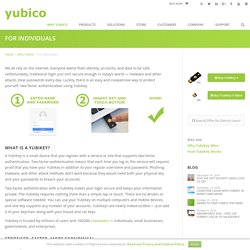
Everyone wants their identity, accounts, and data to be safe. Unfortunately, traditional login just isn’t secure enough in today’s world — malware and other attacks steal passwords every day. Luckily, there is an easy and inexpensive way to protect yourself: two-factor authentication using YubiKey. What is a YubiKey? A YubiKey is a small device that you register with a service or site that supports two-factor authentication. Two-factor authentication with a YubiKey makes your login secure and keeps your information private.
YubiKey is trusted by millions of users and 100,000 customers — individuals, small businesses, governments, and enterprises. Whisper Who Dares: Encryption, Privacy Rights, and the New World Disorder. Yaman AKDENIZ <lawya@leeds.ac.uk> Clive WALKER <law6cw@leeds.ac.uk> University of Leeds United Kingdom Abstract In common with the modes of communication it succeeds and to some extent supplants, the Internet entails both positive and negative consequences for personal privacy.
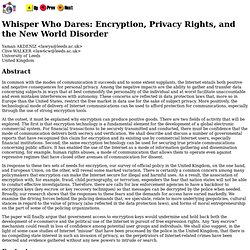
Among the negative impacts are the ability to gather and transfer data concerning subjects in ways that at best commodify the personality of the individual and at worst facilitate unaccountable and even mistaken interferences with autonomy. These concerns are reflected in data protection laws that, more so in Europe than the United States, restrict the free market in data use for the sake of subject privacy. More positively, the technological mode of delivery of Internet communications can be used to afford protection for communications, especially through the use of strong encryption tools.
At the outset, it must be explained why encryption can produce positive goods. Contents Introduction. The Risks of Key Recovery. Hal Abelson [1], Ross Anderson [2], Steven M.
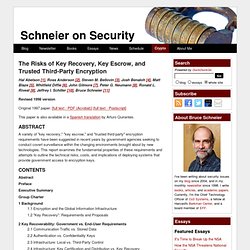
Bellovin [3], Josh Benaloh [4], Matt Blaze [5], Whitfield Diffie [6], John Gilmore [7], Peter G. Neumann [8], Ronald L. Rivest [9], Jeffrey I. Schiller [10], Bruce Schneier [11] Revised 1998 version Original 1997 paper: [full text - PDF (Acrobat)][full text - Postscript] This paper is also available in a Spanish translation by Arturo Quirantes. A variety of "key recovery," "key escrow," and "trusted third-party" encryption requirements have been suggested in recent years by government agencies seeking to conduct covert surveillance within the changing environments brought about by new technologies.
Abstract Preface Executive Summary Group Charter 1 Background 1.1 Encryption and the Global Information Infrastructure 1.2 "Key Recovery": Requirements and Proposals 2 Key Recoverability: Government vs. Members of the law enforcement and intelligence communities continue to express concern about widespread use of unescrowed cryptography. 1. 2. 3. Decisions, Recommendations and other Instruments. I.
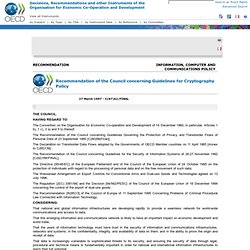
Aims The Guidelines are intended: • To promote the use of cryptography: - To foster confidence in information and communications infrastructures, networks and systems and the manner in which they are used; - To help ensure the security of data, and to protect privacy, in national and global information and communications infrastructures, networks and systems; • To promote this use of cryptography without unduly jeopardising public safety, law enforcement, and national security; The Imapct of Cryptographic Policies and Standards. Equation Group: Meet the NSA 'gods of cyber espionage' Over the last couple of years we have been hearing about ever more sophisticated pieces of malware.

From Stuxnet and Flame to Gauss and most recently Regin, all have shown increasing levels of technical prowess and all have been linked in some way with the US government. These were thought to be the pinnacle of a huge investment in offensive cyber capabilities by the world's wealthiest country. That was, until we learned about Equation. Described by Kaspersky Lab, the Moscow-based security company which uncovered it, as "an almost omnipotent cyberespionage organisation", the group has been called the "God of cyberespionage" and may have been operating undetected for almost two decades.
While Kaspersky's report reveals much about the group, it barely touches the surface of the capabilities of what is likely the most highly-prized jewel in the NSA's cyberespionage crown. What is the Equation group? Finally, an advanced keylogger known as Grok is referenced in the Equation team's source code. Encryption and law Enforcement. How to foil the NSA and GCHQ with strong encryption. "Ye are many - they are few.
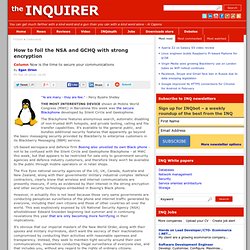
" - Percy Bysshe Shelley THE MOST INTERESTING DEVICE shown at Mobile World Congress (MWC) in Barcelona this week was the secure Blackphone developed by Silent Circle and Geeksphone. The Blackphone features anonymous search, automatic disabling of non-trusted WiFi hotspots, and private texting, calling and file transfer capabilities. It's available to the general public, and bundles additional security features that apparently go beyond the basic messaging security provided by Blackberry to enterprise customers in its Blackberry Messaging (BBM) service.
US-based aerospace and defence firm Boeing also unveiled its own Black phone - not to be confused with the Silent Circle and Geeksphone Blackphone - at MWC this week, but that appears to be restricted for sale only to government security agencies and defence industry customers, and therefore likely won't be available to the public through mobile operators or in retail shops.
Encryption. Return to Privacy Module IV Cryptography [E]ncryption technologies are the most important technological breakthrough in the last one thousand years.
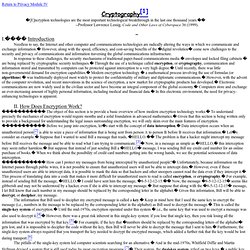
--Professor Lawrence Lessig, Code and Other Laws of Cyberspace 36 (1999). I. Introduction. For Individuals.